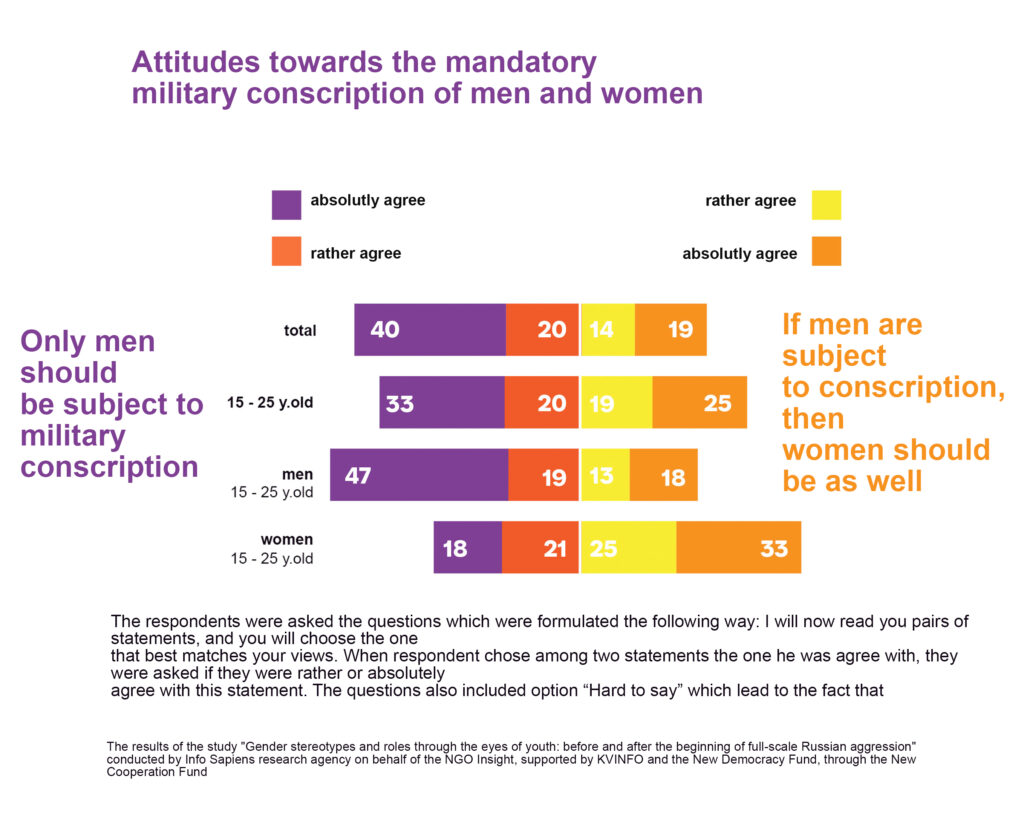Among young people, women share less gender stereotypes than men, including those perceived by some men and women as female “privileges.”
For example, 58% of young women (15-25 years old) agree that “if men are subject to mandatory conscription, then women should be too,” while among young men, 30% support universal conscription for both men and women. Only 19% of young women believe that a man should fully support his family, while among men of the same age group, the number is 24%.
These are the results of the study “Gender stereotypes and roles through the eyes of youth: before and after the beginning of full-scale Russian aggression” conducted by Info Sapiens research agency on behalf of the NGO Insight, supported by KVINFO and the New Democracy Fund, through the New Cooperation Fund. The study includes in-depth interviews and a nationally representative survey of 1,008 respondents from all regions controlled by the government of Ukraine using a random sample of mobile phone numbers.

The survey did not record a strengthening of gender stereotypes, at least at the declarative level, the researchers say. On the contrary, compared to 2018, the beliefs that none of the spouses should be subordinate to each other, that the husband does not have to be the head of the family and provide for it completely, and that it is normal for a wife to be more successful or earn more than her husband have significantly increased.
At the same time, there are a number of stereotypes that are persistent across age groups:
– that men are better political leaders than women: 35% of the population and 34% of young people agree with this statement
– that men are better businessmen: 27% of the population and 24% of young people agree with this statement
– that a man should fully provide for his family: 20% of the population and 21% of young people agree with this statement
– that a man should be the head of the family in any case: 19% of the population and 17% of young people agree.
In general, there is a tendency to change attitudes among young people aged 15-25 (both women and men) regarding the distribution of gender roles within the family, men’s and women’s responsibilities in the family and in everyday life.
At the same time, gender stereotypes that men are better leaders and managers persist even among young people.
“It can be assumed that the main reason for the weakening of gender stereotypes in “everyday life” is a series of educational campaigns and events on gender-based violence in Ukraine. However, there is obviously a lack of awareness and information about women’s leadership and equal opportunities for women and men”, – says Olena Shevchenko, Chair person of Insight NGO.
“In times of war, there is often a kind of “rollback” in gender equality, as men are primarily expected to play the role of defenders, while women are perceived as those in need of protection. However, according to the results of this study, we do not observe an increase in traditional expectations regarding gender roles. I think this is a consequence of the significant progress of Ukrainian society in terms of gender equality, as well as the public visibility of women’s contribution to victory, both in the civilian and military spheres”, – summarizes Olena Strelnyk, co-author of the study, Doctor of Sociology.
According to the researchers, the negative impact of gender stereotypes and behavioral norms on men is the inability to express their emotions, the need to financially support their families, be resilient and strong in any situation, perform hard physical labor, and restrictions related to conscription. For women, it is difficulties with employment and professional fulfillment, building a career, lower wages, sexual objectification, and the need to obey their husbands.